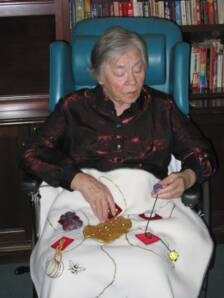A Tribute
When does an ordinary human being become extra-ordinary? For me, this transition occurs when a person becomes an exemplary role model for others. I believe that my father is one such extra-ordinary person, as he models a way of loving that is deep and enduring and a manner of caring that transcends the boundaries of self. Each day, my father quietly demonstrates the qualities of love, patience, commitment, loyalty and respect. And he transmits these values amidst an overwhelming sense of sadness and loss.
For the past several years, my father has acted as primary care-giver for my mother, who has Alzheimer's disease.
My mother's cognitive decline began long before I took any real notice. Yes, I was aware that my father had started to take on more responsibility for the household tasks that had previously been considered my mother's domain. But my sisters and I lived miles away and when we visited, we could easily rationalize this change. After all, my father was retired, and we supported my mother's expectation that he share some of the daily domestic burden. And mom's sunny disposition and ready smile re-assured us that all was well. However, as my mother's cognitive abilities continued to decline, her reliance on my father increased. She became less communicative and progressively more confused. Finally, her voice fell silent.
Eventually, my mother's complete dependence, coupled with a growing concern for his own health, convinced my father to seek full-time care for her. The transition and subsequent loneliness, after fifty-five years of marriage, was very painful. But my father rallied in his role as devoted care-giver and tireless advocate for my mother's well-being. He carries out his responsibilities with a quiet dignity, a strong sense of purpose and a positive attitude. Each day, he lovingly holds her hand as he pushes her wheelchair up and down the hallways, venturing outdoors when weather permits. He sits soothingly at her bedside while she naps. He attentively feeds her lunch and dinner. He hugs and kisses away her anxieties. He encourages her to smile and to laugh. In turn, my father is heartened by my mother's unusually good appetite. He is encouraged by her desire to reach out and touch items he puts in front of her. He is warmed by her smile, and delighted with her return kisses.
A few months ago, my mother was hospitalized with a life threatening infection. In consultation with doctors and family members, it was necessary for my father to continuously make critical decisions about her care. Yes, he would like my mother to be pain free. No, he did not want her subjected to any invasive and potentially painful procedures. Yes, he wanted the doctors to fight the infection so that she could be well again. I remember silently thinking to myself: "Well again? What does that mean?"
Alzheimer's disease is a progressive degenerative brain disorder that seriously affects memory, thinking, language, mood and behavior. This disease is considered one of the most serious challenges facing an aging population, with the numbers of individuals affected by it rising dramatically. Extensive research endeavors continue to increase our knowledge about Alzheimer's disease and there have been significant advances made. Currently, though, there is no known cure or medication to repair damaged brain cells. My father is well aware of the fact that at present, he cannot control the ravages of this disease and he understands the severity of the prognosis for my mother. However, difficult as it must be, my father chooses to see purpose in his life and to be optimistic about the future. Most importantly, he loves my mother for the person she is today, just as he loved her for who she was yesterday and he nourishes each precious moment that they are still able to share together. I believe that this hopeful attitude provides my father with the strength to make the tough decisions and offers him some degree of comfort in the face of painful circumstances.
I have a picture of my mother and I that was taken during her stay in hospital. She is sitting in a wheelchair, staring pale and expressionless at the camera, and I am standing next to her. My mother has her hand wrapped around mine and she is holding it next to her cheek. I don't wonder anymore what my mother knows or doesn't know, or what she remembers or doesn't remember. I have watched and learned from my father about how to care and to communicate on a much deeper and more complex level. My mother and I are connecting in ways that have been veiled for too long - through touch, sound, sight and smell. We are connecting heart to heart where all of our intangible memories are stored.
I am deeply grateful and indebted to my father for subtly teaching our family and everyone around us about the strength of enduring human relationships and for modeling the true meaning of what it is to love.




